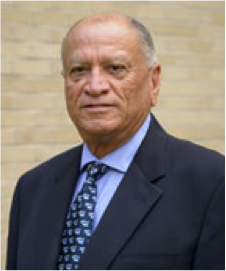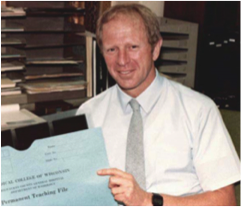Sushil K Sarna, PhD
1942-2017

Dr. Sushil K. Sarna received his undergraduate degree in Electrical Engineering in University of Delhi, India, and his master’s degree and PhD in Electrical Engineering from the University of Alberta, Edmonton, Canada. An interest in biology led him to the laboratory of the renowned physiologist, Dr. Edwin E. Daniel, where he began his academic career with a joint appointment in the Departments of Pharmacology and Electrical Engineering. After a brief stint as Professor at McMaster University, he was recruited to the Medical College of Wisconsin as Professor of Surgery and Physiology where he became Director of Digestive Research Center and Chief of Surgical Research Section at the Zablocki VA Medical Center. In 2002, Dr. Sarna was recruited to the Division of Gastroenterology and Hepatology at University of Texas Medical Branch (UTMB) as the Charlotte Warmoth Professor of Internal Medicine and Professor of Neurosciences and Cell Biology. He passed away in 2017 at age 74 after a short illness.
Dr. Sarna had a productive and innovative research career in the field of gastrointestinal motor and sensory function. His early studies of the smooth muscle and enteric neural regulation of esophageal, gastric, small intestinal and colonic motor functions subsequently led to investigation of motor and sensory dysfunctions in preclinical models of Inflammatory Bowel Disease and Functional Gastrointestinal Disorders. Because his unique background and knowledge of electrical circuits, it is no surprise that his early important work in animals focused on the nature of the slow wave electrical activity of the stomach and intestine. His work contributed significantly to our understanding of the mechanisms and electrical basis of migrating motor complex and giant migrating contractions.
In mid-career, Dr. Sarna’s research at the organ, cellular and molecular levels expanded to inflammation. Seminal publications identified the motor disturbances in inflamed small intestinal and colon that were the basis of diarrheas-producing mass propulsions. He defined how changes in signaling in smooth muscle cells suppressed the phasic contractions, while stimulating the giant migrating contractions, together causing urgency and frequent uncontrolled defecation. His laboratory elucidated the molecular processes behind the alterations of key molecules such as G-proteins, Ca2+ channels, and PKC that are fundamental to the smooth muscle dysfunction in inflammation.
In his later career, Dr. Sarna made significant advances in two contemporary areas of the neurogastroenterology: the role of adverse early life experiences in inducing visceral hypersensitivity and smooth muscle dysfunction, and the role of epigenetics in fetal and neonatal programming of gut dysfunction. In animal models, he demonstrated that chronic stress during mid to late pregnancy alters primary and secondary visceral nociceptive neurons in the colonic smooth muscle of the offspring, which manifested as gender-specific visceral and motor dysfunctions in the adult. He also documented that increased sympathetic activity contributed to chronic stress-induced visceral hypersensitivity. These studies identified epigenetic modulations of specific target genes and introduced the potential for histone acetyltransferases and histone deacetylase inhibitors in reversing these changes.
Dr. Sarna received many awards, including the Jansen Award in Gastroenterology for Outstanding Basic Science Research in 1996 and a Senior Medical Career Scientist Award for the Veterans Administration 1984-2001. He published over 240 peer reviewed manuscripts and reviews. He served on the Editorial Boards of several prestigious gastrointestinal journals, including Gastroenterology and the American Journal of Physiology (Gastrointestinal and Liver Physiology) and was one of the founding editors for our journal Neurogastroenterology and Motility (formerly Journal of Gastrointestinal Motility). He was a member of several GI societies and an officer in the American Motility Society, the International Motility Society and the International Society for the Study of Neurogastroenterology and Motility.
Dr. Sarna was a dedicated and indefatigable mentor who was instrumental in the careers of several young scientists. Those in his lab received rigorous training in experimental design, data analyses, manuscript and grant writing. His capacity to keep his science current with passing time allowed a strong commitment to the advancement of our field through the continuous production of high quality experimental data and publications.




 The 2021 recipient of the American Neurogastroenterology and Motility Society Distinguished Investigator Award for Women In Neurogastroenterology was Dr. Yvette Tache. Dr. Tache is a recognized leading expert in brain-gut interactions and the role of peptides in the underlying mechanisms of stress-related gut dysfunction and central vagal regulation of gut function. Dr. Taché was born in France and after her training joined the Digestive Disease Division at UCLA in 1982. She was appointed Professor-in-Residence in 1987 and was a Distinguished Professor from 2009 until her retirement. Dr.Taché was well funded since by competitive grants obtained from the National Institute of Health (NIH) as well as Veteran Administration (VA) Merit Award since 2000. She was director of the Animal Core within the NIHDDK Digestive Diseases Center up to 2020 and a co-director of the UCLA G. Oppenheimer Center for Neurobiology of Stress and Resilience (CNSR). At the time of her ANMS award she had published 387 peer-reviewed articles, 180 reviews, 19 editorials and edited several books. Professor Taché received numerous awards and honors including being the recipient of NIHDDK MERIT Award, the Distinguished Research Award in Gastrointestinal Physiology from the American Physiological Society, the Janssen Award for Basic Research in Gastrointestinal Motility, Senior Investigator–Basic Science Award from the International Foundation for Functional Gastrointestinal Disorders, a Research Scientist Award from the Functional Brain-Gut Research Group, Outstanding American Gastroenterology Association (AGA) Women in Sciences, Research Mentor Award from the AGA Institute Council and recipient of a Senior Research Career Scientist Award and Middleton Award from the Department of Veteran’s Affairs. Dr. Taché has been a research partner to Dr. Chang and shares in having mentored many researchers – PhDs and MDs in the field of Neurogastroenterology and Motility. Together they are a wonderful example of women partnering and supporting each other to make a world-class academic environment dedicated to professional development of women in gastroenterology.
The 2021 recipient of the American Neurogastroenterology and Motility Society Distinguished Investigator Award for Women In Neurogastroenterology was Dr. Yvette Tache. Dr. Tache is a recognized leading expert in brain-gut interactions and the role of peptides in the underlying mechanisms of stress-related gut dysfunction and central vagal regulation of gut function. Dr. Taché was born in France and after her training joined the Digestive Disease Division at UCLA in 1982. She was appointed Professor-in-Residence in 1987 and was a Distinguished Professor from 2009 until her retirement. Dr.Taché was well funded since by competitive grants obtained from the National Institute of Health (NIH) as well as Veteran Administration (VA) Merit Award since 2000. She was director of the Animal Core within the NIHDDK Digestive Diseases Center up to 2020 and a co-director of the UCLA G. Oppenheimer Center for Neurobiology of Stress and Resilience (CNSR). At the time of her ANMS award she had published 387 peer-reviewed articles, 180 reviews, 19 editorials and edited several books. Professor Taché received numerous awards and honors including being the recipient of NIHDDK MERIT Award, the Distinguished Research Award in Gastrointestinal Physiology from the American Physiological Society, the Janssen Award for Basic Research in Gastrointestinal Motility, Senior Investigator–Basic Science Award from the International Foundation for Functional Gastrointestinal Disorders, a Research Scientist Award from the Functional Brain-Gut Research Group, Outstanding American Gastroenterology Association (AGA) Women in Sciences, Research Mentor Award from the AGA Institute Council and recipient of a Senior Research Career Scientist Award and Middleton Award from the Department of Veteran’s Affairs. Dr. Taché has been a research partner to Dr. Chang and shares in having mentored many researchers – PhDs and MDs in the field of Neurogastroenterology and Motility. Together they are a wonderful example of women partnering and supporting each other to make a world-class academic environment dedicated to professional development of women in gastroenterology.
